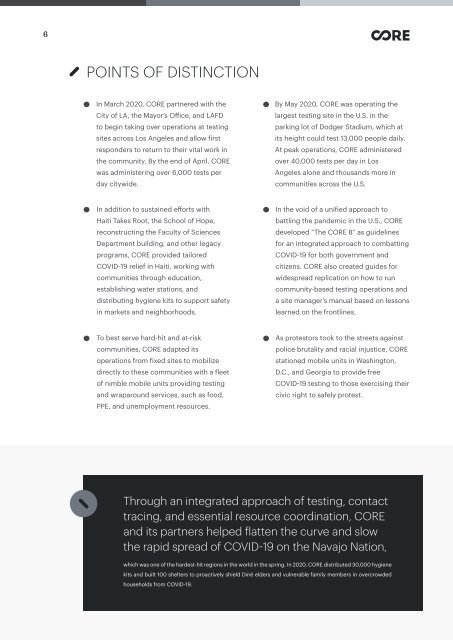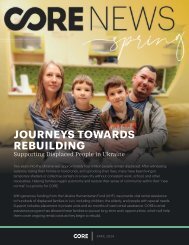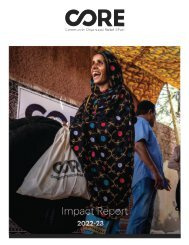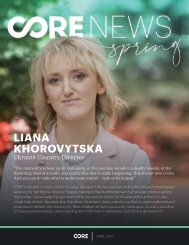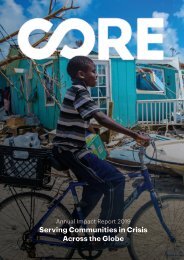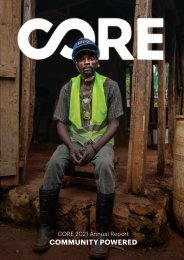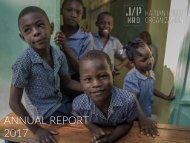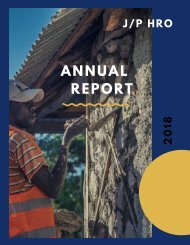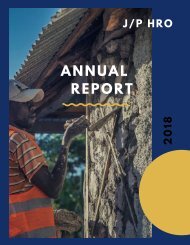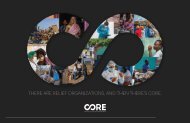CORE Response - Annual Report 2020
A document summarizing the mission, leadership, and work performed by CORE Response in 2020. In addition to highlighting individuals and communities served, the 2020 Annual Report focuses on transparency through the inclusion of key donors and the standard financial disclosures from the year.
A document summarizing the mission, leadership, and work performed by CORE Response in 2020. In addition to highlighting individuals and communities served, the 2020 Annual Report focuses on transparency through the inclusion of key donors and the standard financial disclosures from the year.
You also want an ePaper? Increase the reach of your titles
YUMPU automatically turns print PDFs into web optimized ePapers that Google loves.
6<br />
POINTS OF DISTINCTION<br />
In March <strong>2020</strong>, <strong>CORE</strong> partnered with the<br />
City of LA, the Mayor’s Office, and LAFD<br />
to begin taking over operations at testing<br />
sites across Los Angeles and allow first<br />
responders to return to their vital work in<br />
the community. By the end of April, <strong>CORE</strong><br />
was administering over 6,000 tests per<br />
day citywide.<br />
By May <strong>2020</strong>, <strong>CORE</strong> was operating the<br />
largest testing site in the U.S. in the<br />
parking lot of Dodger Stadium, which at<br />
its height could test 13,000 people daily.<br />
At peak operations, <strong>CORE</strong> administered<br />
over 40,000 tests per day in Los<br />
Angeles alone and thousands more in<br />
communities across the U.S.<br />
In addition to sustained efforts with<br />
Haiti Takes Root, the School of Hope,<br />
reconstructing the Faculty of Sciences<br />
Department building, and other legacy<br />
programs, <strong>CORE</strong> provided tailored<br />
COVID-19 relief in Haiti, working with<br />
communities through education,<br />
establishing water stations, and<br />
distributing hygiene kits to support safety<br />
in markets and neighborhoods.<br />
In the void of a unified approach to<br />
battling the pandemic in the U.S., <strong>CORE</strong><br />
developed “The <strong>CORE</strong> 8” as guidelines<br />
for an integrated approach to combatting<br />
COVID-19 for both government and<br />
citizens. <strong>CORE</strong> also created guides for<br />
widespread replication on how to run<br />
community-based testing operations and<br />
a site manager’s manual based on lessons<br />
learned on the frontlines.<br />
To best serve hard-hit and at-risk<br />
communities, <strong>CORE</strong> adapted its<br />
operations from fixed sites to mobilize<br />
directly to these communities with a fleet<br />
of nimble mobile units providing testing<br />
and wraparound services, such as food,<br />
PPE, and unemployment resources.<br />
As protestors took to the streets against<br />
police brutality and racial injustice, <strong>CORE</strong><br />
stationed mobile units in Washington,<br />
D.C., and Georgia to provide free<br />
COVID-19 testing to those exercising their<br />
civic right to safely protest.<br />
Through an integrated approach of testing, contact<br />
tracing, and essential resource coordination, <strong>CORE</strong><br />
and its partners helped flatten the curve and slow<br />
the rapid spread of COVID-19 on the Navajo Nation,<br />
which was one of the hardest-hit regions in the world in the spring. In <strong>2020</strong>, <strong>CORE</strong> distributed 30,000 hygiene<br />
kits and built 100 shelters to proactively shield Diné elders and vulnerable family members in overcrowded<br />
households from COVID-19.


